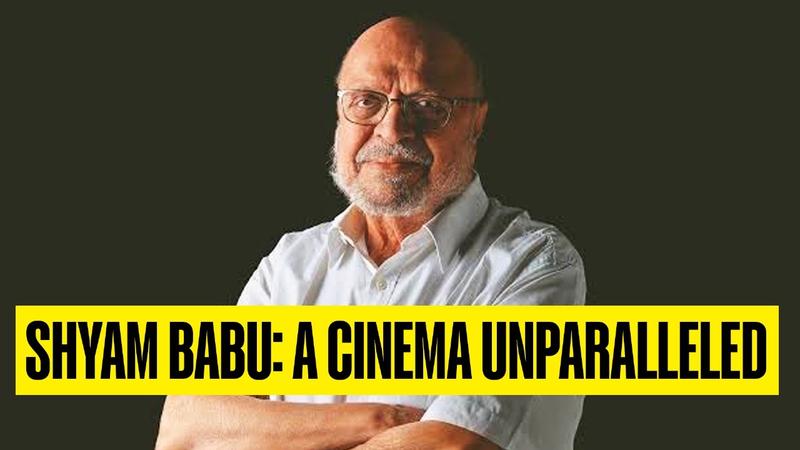Published 09:58 IST, December 24th 2024
Shyam Benegal (1934-2024): Family, Movies, Awards Of Auteur Who Ushered In 'New Wave' Of Indian Cinema
Shyam Benegal was born on December 14, 1934, in a Konkani-speaking Chitrapur Saraswat Brahmin family in Hyderabad, as Shyam Sunder Benegal.

Shyam Benegal Death: Veteran filmmaker and Dadasaheb Phalke Award winner died at the age of 90 on the night of December 23. The filmmaker's daughter confirmed the news of his passing to PTI. Shyam Benegal was 90 years old and passed away after fighting a chronic kidney disease. The whole nation is mourning following the passing of the legendary director. His films were not only stories but captured the lives of ordinary people caught in extraordinary circumstances. Filmmakers, actors, and industry veterans expressed their sorrow. With almost 7 decades of career, India’s master maker journey is inspiring like no other.
Shyam Benegal made his first film at the age of 12
Shyam Benegal was born on December 14, 1934, in a Konkani-speaking Chitrapur Saraswat Brahmin family in Hyderabad, as Shyam Sunder Benegal. His father hailed from Karnataka.

When he was twelve years old, he made his first film, on a camera given to him by his photographer father Sridhar B. Benegal. He received an M.A. in Economics from Osmania University, Hyderabad. There he established the Hyderabad Film Society.
Shyam Benegal met his wife through movies
Shyam Benegal is married to the former editor of India Book House Nira Mukerji Benegal. She has also designed costumes for a few of Shyam Benegal's films.

The couple has a daughter Pia Benegal, who is also a costume designer known for her work in films like Dil Se.
From copywriting to filmmaking
In 1959, he started working as a copywriter at a Mumbai-based advertising agency, Lintas Advertising, where he steadily rose to become the creative head. Meanwhile, Benegal made his first documentary in Gujarati, Gher Betha Ganga (Ganges at the Doorstep) in 1962. His first feature film had to wait another decade while he worked on the script.

In 1963 he had a brief stint with another advertising agency called ASP (Advertising, Sales and Promotion). During his advertising years, he directed over 900 sponsored documentaries and advertising films.
Between 1966 and 1973, Shyam taught at the Film and Television Institute of India (FTII), Pune, and twice served as the institute's chairman: 1980–83 and 1989–92. By this time he had already started making documentaries. One of his early documentaries A Child of the Streets (1967), garnered him wide acclaim. In all, he has made over 70 documentaries and short films.
He was awarded the Homi J. Bhabha Fellowship (1970–72) which allowed him to work at the Children's Television Workshop, in New York, and later at Boston's WGBH-TV.
His lens was empathetic, rooted in Indian reality and always political, Shyam Benegal was the arthouse pioneer who rewrote the rules of cinema with films such as Ankur, Nishant and Bhumika that blazed an alternate path to mainstream movies.

Benegal, who burst on the scene with his first film Ankur in 1974, was a chronicler of India’s times and politics, that rare artiste who worked both in non-fiction and fiction across varied mediums -- films, documentaries, biopics and ambitious TV shows.
The remarkable oeuvre boasts the documentary on another great, Satyajit Ray, Filmmaker, and television shows, the ambitious Bharat Ek Khoj, based on Jawaharlal Nehru's book Discovery of India, and Samvidhaan, a 10-part serial on the making of the Constitution.
Through his work, which was distinctly different and alternate to mainstream movies as audiences knew till then, Benegal made several stars out of great actors. There was Shabana Azmi, Smita Patil, Naseeruddin Shah and Girish Karnad of course. And then there were those stars such as Shashi Kapoor and Rekha who gave arguably their best performances in Kalyug and Vijeta.

Benegal disliked the term "middle cinema" used to bracket his films and preferred that his work be called "new or alternate cinema".
"I don’t remember who said this: ‘Every social act of yours is also a political act whether you like it or not’,” he told PTI in 2022.

"One has to be as objective as possible and the second point is to be sympathetic. If you are not objective, you are already colouring the story with your subjectivity. Sympathy is necessary. When I say sympathy, I mean empathy so you can be one with the subject," Benegal said.
He was the first one who make a film out of crowdfunding
The late playwright Vijay Tendulkar wrote the screenplay Manthan, a film on the milk cooperative movement in Anand, Gujarat , made with Rs 2 funding from five lakh farmers, and “Nishant”, set in a feudal family. The late music composer Vanraj Bhatia, cinematographer Govind Nihalani and the great theatre director Satyadev Dubey worked with him in multiple films. Girish Karnad wrote the screenplay for Bhumika and Ruskin Bond for “Junoon”.

Interestingly, Mahatma Gandhi was the one personality Benegal explored in all his complexities and significance. In "The Making of the Mahatma", Rajit Kapoor portrayed Gandhi during his South African years. Gandhi appeared in two episodes of "Bharat Ek Khoj" and was played by Neeraj Kabi in the 10-part series Samvidhaan. In his biopic on Netaji, 2005's " Netaji Subhas Chandra Bose: The Forgotten Hero", the role of Gandhi was enacted by Surendra Rajan.
Shyam Benegal was a much-awarded filmmaker
Benegal received many National Awards in his career. He got the Padma Shri in 1976 and the Padma Bhushan in 1991. In 2005, he was honoured with the Dadasaheb Phalke Award, India's highest award in the field of cinema. Benegal also served as a Rajya Sabha MP from 2006 to 2012.
Get Current Updates on India News, Entertainment News along with Latest News and Top Headlines from India and around the world.
Updated 10:47 IST, December 24th 2024




